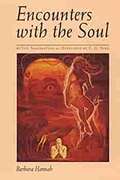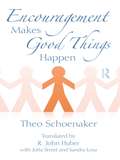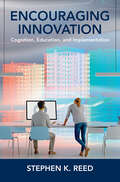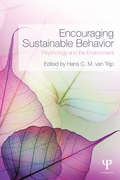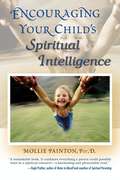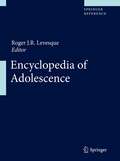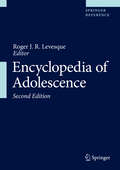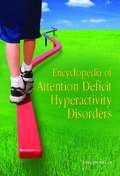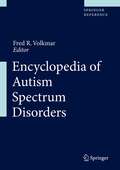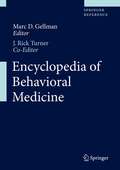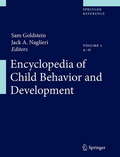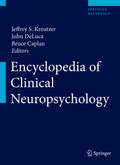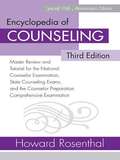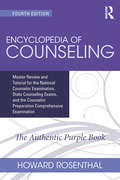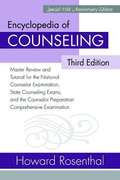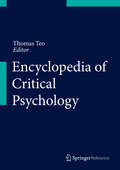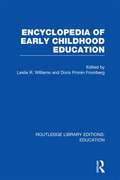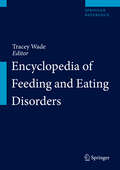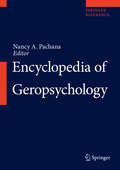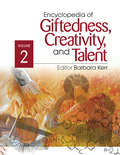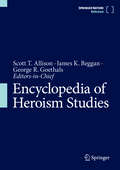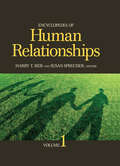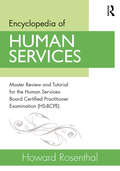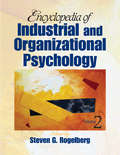- Table View
- List View
Encounters with the Soul: Active Imagination As Developed By C. G. Jung
by Barbara HannahBarbara Hannah, Jungian analyst and author, explores Jung's method of "active imagination," often considered the most powerful tool in analytical psychology for achieving direct contact with the unconscious and attaining greater inner awareness. Using historical and contemporary case studies, Hannah traces the human journey toward personal wholeness. This approach to confronting the unconscious is a healing process that applies to both men and women and deals in depth with the injured feminine as well as many powerful archetypal forces. “This is the first and only book I know of which can promote the understanding of 'active imagination' by illustrating through various examples, the steps, pitfalls and successes of this method of encountering the unconscious.”- -Marie-Louise von Franz
Encouragement Makes Good Things Happen
by Theo SchoenakerAvailable in English for the first time, Encouragement Makes Good Things Happen is a translation of the bestselling German book Mut Tut Gut. It describes a courageous and encouraging style of living and focuses on the belief that human encouragement is the most important natural ingredient for the healthy development of human beings. Written in an engaging and conversational tone, the book first explores the negative consequences of discouragement on the individual and on society as a whole. It then discusses what encouragement is, why it is important in people's lives, and how a person can encourage both himself and others. Several exercises are also included to help guide readers in the encouragement of others. Mental health practitioners of all disciplines and in any setting will find that both they are their clients will benefit from the insights garnered and tested by the author of this engaging and compelling book.
Encouraging Innovation: Cognition, Education, and Implementation
by Stephen K. Reed'Encouraging Innovation: Cognition, Education, and Implementation' is of interest to people who desire to become more innovative in their daily lives and careers. Part I discusses the cognitive and social skills required for innovation – reasoning, problem solving, creativity, group decision making, and collaborative problem solving. The second part discusses education – the development of cognitive skills and talent, application of relevant learning theories, methods and curricula for enhancing creativity, creativity across disciplines, and design education. Part III discusses the implementation of these skills in society – the transition from theory to practice, business innovation, social innovation, and organizational support. Whereas business innovation is related to commercialization, market demands, and profitability, social innovation addresses fulfilling social needs and public demands. Organizational support for innovation occurs at international, national, agency, and regional levels.
Encouraging Sustainable Behavior: Psychology and the Environment
by Hans C. M. van TrijpIncreasingly it is being recognized that consumer behavior may be a key trigger in the march toward sustainable development. Several lines of psychological theory and approaches have been developed relatively independently, each of which may provide major implications and action points on how consumers might be moved toward more sustainable behavior. This book is the first that brings together this variety of perspectives and theoretical angles around the common ambition of sustainable development. The contributors are all leading social scientists in the field of consumer behavior who met the challenge to sketch out their theoretical perspectives, but also to go beyond their normal theorizing and think out of the box in order to show how these theoretical perspectives might be made actionable in terms of key managerial and policy perspectives toward sustainable development. The result is a book that shows a wealth of information and approaches the question of how to encourage sustainable behavior from a myriad of divergent perspectives. This should stimulate scientists and policy-makers alike to find similarities, differences, and synergies between state-of-the-art psychological thinking about how to most effectively stimulate sustainable consumer behavior.
Encouraging Your Child's Spiritual Intelligence
by Mollie PaintonMore and more children are expressing spiritual qualities, and parents, caregivers, pediatricians, teachers, and therapists are increasingly taking notice of children's spiritual lives. Mollie Painton, Psy.D., a well-known child therapist, helps parents understand this phenomenon in the framework of spiritual intelligence. By understanding this concept, we can honor our children's gifts and develop our own spiritual intelligence along the way. Any parent whose child has had an imaginary friend, talked with a deceased relative, or been receptive to the pain and emotion of others will find guidance and inspiration in Encouraging your Child's Spiritual Intelligence. Dr. Painton's thoughtful quizzes and advice provide added support and insight throughout the book. Adults, who have had their own spiritual experiences in childhood dismissed, will rediscover their original spiritual connection and become valuable spiritual partners with their children.
Encuentro de Pasados: Un minuto puede cambiar todo
by Hailane BragaLorena es una chica rica que posee todo lo que el dinero puede comprar. Además de rica es linda, dulce y llena de vida. Lo que ella no esperaba era que un golpe, sin aviso del destino, terminará con su compromiso y su historia de amor de ocho años. Sin forma de continuar su vida en su ciudad, decide mudarse a Brasilia y vivir un día a la vez, intentando olvidar a William y el dolor que sintió por perderlo. No contaba con el cambio de planes que la vida le haría. Una maraña de historias se cruza en su camino, mostrando que las vueltas que da el mundo pueden cambiar todo tu destino, no una, sino varias veces. Lorena ya sabía que el dinero no lo compraba todo, pero comprobó la frase en su propia historia. Encuentro de Pasados es una historia de amor, perdón, búsqueda del equilibrio y comprensión. No siempre el curso que dibujamos sigue recto, pero la curva que hace puede traer algo mucho mayor.
Encyclopedia of Adolescence
by Roger J.R. LevesqueThe Encyclopedia of Adolescence breaks new ground as an important central resource for the study of adolescence. Comprehensive in breath and textbook in depth, the Encyclopedia of Adolescence - with entries presented in easy-to-access A to Z format - serves as a reference repository of knowledge in the field as well as a frequently updated conduit of new knowledge long before such information trickles down from research to standard textbooks. By making full use of Springer's print and online flexibility, the Encyclopedia is at the forefront of efforts to advance the field by pushing and creating new boundaries and areas of study that further our understanding of adolescents and their place in society. Substantively, the Encyclopedia draws from four major areas of research relating to adolescence. The first broad area includes research relating to "Self, Identity and Development in Adolescence". This area covers research relating to identity, from early adolescence through emerging adulthood; basic aspects of development (e.g., biological, cognitive, social); and foundational developmental theories. In addition, this area focuses on various types of identity: gender, sexual, civic, moral, political, racial, spiritual, religious, and so forth. The second broad area centers on "Adolescents' Social and Personal Relationships". This area of research examines the nature and influence of a variety of important relationships, including family, peer, friends, sexual and romantic as well as significant nonparental adults. The third area examines "Adolescents in Social Institutions". This area of research centers on the influence and nature of important institutions that serve as the socializing contexts for adolescents. These major institutions include schools, religious groups, justice systems, medical fields, cultural contexts, media, legal systems, economic structures, and youth organizations. "Adolescent Mental Health" constitutes the last major area of research. This broad area of research focuses on the wide variety of human thoughts, actions, and behaviors relating to mental health, from psychopathology to thriving. Major topic examples include deviance, violence, crime, pathology (DSM), normalcy, risk, victimization, disabilities, flow, and positive youth development.
Encyclopedia of Adolescence
by Roger J.R. LevesqueThe second edition of this encyclopedia continues to break new ground as an important resource for the study of adolescence. Comprehensive in breath and textbook in depth, the second edition – with entries presented in easy-to-access A to Z format – serves as a reference repository of knowledge in the field as well as a frequently updated conduit of new research and knowledge long before such information trickles down to standard textbooks. This updated and expanded major reference work advances the field by pushing and creating new boundaries and areas of study that further our understanding of adolescents and their place in society. In addition to the original 730 entries, the new edition adds more than 200 new essays as well as updates to many other entries. Substantively, the second edition continues to draw from four major areas of research relating to adolescence:The first broad area includes research relating to "Self, Identity and Development in Adolescence"The second broad area centers on "Adolescents’ Social and Personal Relationships".The third area examines "Adolescents in Social Institutions"."Adolescent Mental Health" constitutes the last major area of research.This unique, comprehensive second edition of the Encyclopedia of Adolescence is an essential reference for advanced undergraduate and graduate students as well as researchers, professors, clinicians, and other practitioners across such related disciplines as developmental psychology, criminology and criminal Justice, adolescent psychiatry, child and school psychology, family, and public health.
Encyclopedia of Attention Deficit Hyperactivity Disorders
by Evelyn B. KellyScience writer Kelly provides information on the controversial family of disorders for high school and college students, parents, teachers, and other non-specialists. She is not pushing a particular theory or approach, but sets out arguments and claims proffered by proponents of them. Medical information is referenced to researchers and Web sites. A sampling of topics shows the anticonvulsive medication carbamezepine, physician and writer Heinrich Hoffman, industrial and environmental toxins, and teaching children with ADHD. Entry-specific lists for further reading refer to the bibliography. There is little cross-referencing. Annotation c2009 Book News, Inc., Portland, OR (booknews.com)
Encyclopedia of Autism Spectrum Disorders
by Fred R. VolkmarThis major reference work breaks new ground as an electronic resource for students, educators, researchers, and professionals. Comprehensive in breath and textbook in depth, the Encyclopedia of Autism Spectrum Disorders serves as a reference repository of knowledge in the field as well as a regularly updated conduit of new knowledge long before such information trickles down from research to standard textbooks. The Encyclopedia consists of 5 volumes and approximately 1,500 entries divided by the major conceptual areas of ASD and PDDs, including: - Research trends and findings - Behavior/speech - Communication - Treatments - Education Taking advantage of the techniques offered by the electronic medium, the Encyclopedia of Autism Spectrum Disorders offers an extensive cross-referencing system facilitating search and retrieval of information.
Encyclopedia of Behavioral Medicine
by Marc Gellman J. Rick TurnerFrom Neil Schneiderman's Foreword: Because behavioral medicine has been constructed based on the understanding of relationships among behavior, psychosocial processes, and sociocultural contexts, the field is well positioned to take a leadership role in informing future health care policies. The field of behavioral medicine appears to have a bright, important future.... A small sampling of entries from Encyclopedia of Behavioral Medicine: Abuse, child; Active coping; Adherence; Adrenaline; AIDS; Back pain; Behavioral medicine; Benefit-risk estimation; Binge eating; Bogalusa Heart Study; Cachexia; Cancer prevention; Cancer, testicular; Children's Health Study; Chronobiology; Coping strategies; Database development and management; Death, assisted; Developmental disabilities; Diabetes; Disparities; Eating disorders; Ecosocial theory; Effect modification; End-of-life care; Epigenetics; Expressive writing and health; Fall risk behavior; Family practice/medicine; Family, relationships; Fatigue; Foot care; Functional somatic syndromes; Galvanic skin response ; Gender differences ; Gene-environment interaction; Genetic polymorphisms ; Genital herpes ; Hamilton Anxiety Scale; Headaches, types of; Health systems; Hearing loss; Heart failure; Heart rate; Illness behavior; Immune function; Insomnia; Integrative medicine; Ischemic heart disease; Kaposi sarcoma; Kuopio Ischemic Heart Disease Study; Learned helplessness; Lifespan; Lifestyle, sedentary; Lipid abnormalities; Loneliness; Lung function; Magnetic resonance imaging; Maternal stress; Mean (average); Medication compliance; Methodology; Mini Mental State Examination; National Cancer Institute; National Children's Study; Negative affect; Neuroendocrine activation; Nigh shift workers and health; Obesity; Occupational therapy; Organ transplantation; Osteopenia/osteoporosis; Oxytocin; Pain; Pain anxiety; Palliative care; Panic attack; Physical activity interventions; Placebo effect; Post-traumatic stress disorder; Racism; Randomized clinical trial; Regression analysis; Resilience; Risk perception; Risky behavior; Secondary prevention; Selye, Hans; Self-medication; Self-monitoring; Stress test; Successful aging; Tachycardia; Theory of planned behavior; Therapy, physical; Tinnitus; Twin studies; Unipolar depression; Usual care; Validity; Vasoconstriction; Vassopressin; Verbal Rating Scale; Weiss, Stephen M.; Women's health; Women's Health Initiative; Worry; Wound healing; Yoga; Zung Depression Inventory
Encyclopedia of Child Behavior and Development
by Sam Goldstein Jack A. NaglieriThis major reference work breaks new ground as an electronic resource for students, educators, researchers, and professionals. Encyclopedic in breath, textbook in depth, Child Behavior and Development serves as a reference repository of knowledge in the field as well as a frequently updated conduit of new knowledge long before such information trickles down from research to standard textbooks. Presented in A to Z format, the Encyclopedia of Child Behavior and Development consists of three volumes that address the major conceptual areas of child development: learning, behavior, and emotions. Taking advantage of the techniques offered by the electronic medium, the Encyclopedia of Child Behavior and Development offers an extensive cross-referencing system that facilitates speedy search and retrieval of information.
Encyclopedia of Clinical Neuropsychology
by Bruce Caplan Jeffrey Kreutzer John DelucaThis encyclopedia serves as a unified, comprehensive reference for professionals involved in the diagnosis, evaluation, and rehabilitation of adult patients and children with neuropsychological disorders. It addresses psychological, psychosocial, and psychiatric aspects of an array of neurological disorders, emphasizing treatment and rehabilitation, not just assessment and diagnosis.
Encyclopedia of Counseling
by Howard RosenthalIn the third edition of Howard Rosenthal's best-selling test preparation guide for the National Counselor Examination (NCE), students get more help than ever with an expanded section on marriage and family counseling, new material on web counseling, and updated material throughout. This resource now includes over 1,050 tutorial questions/answers and a new "Final Review and Last Minute Super Review Boot Camp" section. This guide is an ideal review tool for state licensing, the NCC credential, and preparation for written and oral boards. And because the new Counselor Preparation Comprehensive Examination (CPCE), draws from the same subject areas, the Encyclopedia is a perfect study guide for the CPCE as well. Written in a unique question/answer format, with a quick reference index, this is also an essential student reference volume for use in any counseling, social work, or human services course. Download the accompanying app today! This effective, authoritative and easy-to-use exam preparation app offers over 300 questions to help you revise for, and pass, the National Counselor Examination (NCE) and the Counselor Preparation Comprehensive Examination (CPCE). Howard Rosenthal's best-selling test preparation guides have helped thousands of students pass the NCE and CPCE. In this accompanying app, test-takers will find more than 300 interactive multiple-choice questions (and detailed answers), including nearly 50 brand-new questions and answers and a summary of the October 2012 changes to the test. For Apple/iOS | For Android
Encyclopedia of Counseling: Master Review and Tutorial for the National Counselor Examination, State Counseling Exams, and the Counselor Preparation Comprehensive Examination
by Howard RosenthalWith more questions and answers than any other edition, the Encyclopedia of Counseling, Fourth Edition, is still the only book you need to pass the NCE, CPCE, and other counseling exams. Every chapter has new and updated material and is still written in Dr. Rosenthal's lively, user-friendly style counselors know and love. The book’s new and improved coverage incorporates a range of vital topics, including social media, group work in career counseling, private practice and nonprofit work, addictions, neurocounseling, research trends, the DSM-5, the new ACA and NBCC codes of ethics, and much, much more.
Encyclopedia of Counseling: Master Review and Tutorial for the National Counselor Examination, State Counseling Exams, and the Counselor Preparation Comprehensive Examination (Third Edition)
by Howard RosenthalIn the third edition of Howard Rosenthal's best-selling test preparation guide for the National Counselor Examination (NCE), students get more help than ever with an expanded section on marriage and family counseling, new material on web counseling, and updated material throughout. This resource now includes over 1,050 tutorial questions/answers and a new "Final Review and Last Minute Super Review Boot Camp" section. This guide is an ideal review tool for state licensing, the NCC credential, and preparation for written and oral boards. And because the new Counselor Preparation Comprehensive Examination (CPCE), draws from the same subject areas, the Encyclopedia is a perfect study guide for the CPCE as well. Written in a unique question/answer format, with a quick reference index, this is also an essential student reference volume for use in any counseling, social work, or human services course.
Encyclopedia of Critical Psychology
by Thomas TeoEncyclopedia of Critical Psychology is a comprehensive reference work and is the first reference work in English that comprehensively looks at psychological topics from critical as well as international points of view. Thus, it will appeal to all committed to a critical approach across the Encyclopedia of Critical Psychology, for alternative analyses of psychological events, processes, and practices. The Encyclopedia of Critical Psychology provides commentary from expert critical psychologists from around the globe who will compose the entries. The Encyclopedia of Critical Psychology will feature approximately 1,000 invited entries, organized in an easy to use A-Z format. The encyclopedia will be compiled under the direction of the editor who has published widely in the field of critical psychology and due to his international involvements is knowledgeable about the status of critical psychology around the world. The expert contributors will summarize current critical-psychological knowledge and discuss significant topics from a global perspective.
Encyclopedia of Early Childhood Education (Routledge Library Editions: Education)
by Doris Pronin Fromberg Leslie R. WilliamsThis Encyclopedia is a reference work about young children in the USA, designed for use by policy makers, community planners, parents of young children, teacher and early childhood educators, programme and school administrators, among others. The field of early childhood education has been affected by changes taking place in the nation’s economy, demographics, schools, communities and families that influence political and professional decisions. These diverse historical, political economic, socio-cultural, intellectual and educational influences on early childhood education have hindered the development of a clear definition of the field. The Encyclopedia provides an opportunity to define the field against the background of these influences and relates the field of early childhood education to its diverse contexts and to the cultural and technological resources currently affecting it.
Encyclopedia of Feeding and Eating Disorders
by Tracey WadeThe field of feeding and eating disorders represents one of the most challenging areas in mental health, covering childhood, adolescent and adult manifestations of the disorders and requiring expertise in both the physical and psychological issues that can cause, maintain, and exacerbate these disorders. The scope of the book is an overview of all the feeding and eating disorders from "bench to bedside", incorporating recent changes introduced into the Diagnostic and Statistical Manual of Mental Disorders, Fifth Edition (DSM-5). The aim is to present one of the first complete overviews of the newly defined area of feeding and eating disorders with respect to genetics, biology and neuroscience through to theory and its application in developing clinical approaches to the prevention and treatment of feeding and eating disorders.
Encyclopedia of Geropsychology
by Nancy A. PachanaThis encyclopedia brings together key established and emerging research findings in geropsychology. It is a comprehensive coverage of the entire breadth of the field, giving readers access to all major subareas and illustrating their interconnections with other disciplines. Entries delve deep into key areas of geropsychology such as perception, cognition, clinical, organizational, health, social, experimental and neuropsychology. In addition to that, the encyclopedia covers related disciplines such as neuroscience, social science, population health, public policy issues pertaining to retirement, epidemiology and demography and medicine. Paying careful attention to research internationally, it cites English and non-English empirical literature from around the globe. This encyclopedia is relevant to a wide audience that include researchers, clinicians, students, policy makers and nongovernmental agencies.
Encyclopedia of Giftedness, Creativity, and Talent
by Barbara A. KerrLibrary Journal Best Reference 2009Educators have begun to recognize that identifying and accommodating students who are slower to learn may leave behind those who learn rapidly and think creatively. The nature of intelligence, the sources of innovation, and the ways to nurture special abilities are now topics of great interest to scholars in a wide variety of disciplines and to the general public. Policymakers, ranging from school board members to leaders of nations, must also make practical decisions about how communities and societies will treat their brightest, most promising students.With more than 400 entries, these two volumes review research findings on giftedness, talent, and creativity and their effect on education, training, science and the arts, government policy, and everyday life. The Encyclopedia of Giftedness, Creativity, and Talent provides a balanced, objective assessment of the various perspectives on the nature of intelligence, innovation, and optimal states. This state-of-the-art resource covers all major facets of the field, including achievement motivation, artistic ability, creative personality, emotional intelligence, gender differences, genius, intelligence testing, learning styles, minority underrepresentation, multiple intelligences, musical ability, prodigies, scientists, self actualization, thinking skills, and more.Key ThemesAssessment and IdentificationCreativity StudiesCultural IssuesEducationEminent PeopleExceptionalitiesIntelligenceNeuroscience and GeneticsPopulationsPrograms and InterventionsPsychological IssuesTalent DomainsTheories and ModelsKey FeaturesProvides a balanced and critical discussion of the controversies that have animated research and theory makingClarifies which grouping and instructional strategies promote the best outcomes in achievement and social/emotional development of gifted childrenHelps educators make informed decisions about the identification strategies and the curriculum models that best meet their students' needsContains thousands of pertinent facts from the fields of education, psychology, sociology, and the artsEvaluates policies that have hindered gifted children and makes a persuasive case for appropriately challenging and differentiated educationExamines how giftedness, creativity, and talent were defined in the past and how current meanings have emerged.
Encyclopedia of Heroism Studies
by George R. Goethals Scott T. Allison James K. BegganThis reference work is an important resource in the growing field of heroism studies. It presents concepts, research, and events key to understanding heroism, heroic leadership, heroism development, heroism science, and their relevant applications to businesses, organizations, clinical psychology, human wellness, human growth potential, public health, social justice, social activism, and the humanities. The encyclopedia emphasizes five key realms of theory and application: Business and organization, focusing on management effectiveness, emotional intelligence, empowerment, ethics, transformational leadership, product branding, motivation, employee wellness, entrepreneurship, and whistleblowers; clinical-health psychology and public health, focusing on stress and trauma, maltreatment, emotional distress, bullying, psychopathy, depression, anxiety, family disfunction, chronic illness, and healthcare workers’ wellbeing; human growth and positive psychology, discussing altruism, authenticity, character strengths, compassion, elevation, emotional agility, eudaimonia, morality, empathy, flourishing, flow, self-efficacy, joy, kindness, prospection, moral development, courage, and resilience; social justice and activism, highlighting anti-racism, anti-bullying, civil disobedience, civil rights heroes, climate change, environmental heroes, enslavement heroes, human rights heroism, humanitarian heroes, inclusivity, LGBTQ+ heroism, #metoo movement heroism, racism, sustainability, and women’s suffrage heroes; and humanities, relating to the mythic hero’s journey, bliss, boon, crossing the threshold, epic heroes, fairy tales, fiction, language and rhetoric, narratives, mythology, hero monomyth, humanities and heroism, religious heroes, and tragic heroes.
Encyclopedia of Human Relationships
by Harry T. Reis Susan SprecherLibrary Journal Best Reference 2009"An excellent gateway to further examination of any of the subdisciplines of relationship science, or as a research tool in its own right." —Library JournalRelationships are fundamental to nearly all domains of human activity, from birth to death. When people participate in healthy, satisfying relationships, they live, work, and learn more effectively. When relationships are distressed or dysfunctional, people are less happy, less healthy, and less productive. Few aspects of human experience have as broad or as deep effects on our lives.The Encyclopedia of Human Relationships offers an interdisciplinary view of all types of human associations—friends, lovers, spouses, roommates, coworkers, teammates, parents and children, cousins, siblings, acquaintances, neighbors, business associates, and so forth. Although each of these connections is unique in some respect, they share a common core of principles and processes. These three volumes provide a state-of-the-art review of the extensive theories, concepts, and empirical findings about human relationships.Key FeaturesCompiles leading-edge information about how people think, feel, and act toward each otherPresents the best in the field—authors who have contributed significant scientific knowledge about personal relationships over the past several decades.Offers a diverse approach to relationship science with contributions from psychology, sociology, communication, family studies, anthropology, physiology, neuroscience, history, economics, and legal studiesKey Themes:Cognitive Processes in RelationshipsCommunication ProcessesCreating and Maintaining ClosenessDating, Courtship, and MarriageThe Dark Side of RelationshipsEmotion Processes in RelationshipsFamilyFriendship and Caregiving in AdulthoodHealth and the Biology of RelationshipsMethods for Studying RelationshipsPersonality and Individual DifferencesPrevention and Repair of Relationship ProblemsPsychological ProcessesSexualitySocial Context of RelationshipsSocial Relations in Childhood and AdolescenceTheoretical Approaches to Studying RelationshipsTypes of RelationshipsOur relationships influence virtually all aspects of our everyday existence and are of deep interest to students, researchers, academics, and laypeople alike. This Encyclopedia is an invaluable addition to any academic or public library.
Encyclopedia of Human Services: Master Review and Tutorial for the Human Services-Board Certified Practitioner Examination (HS-BCPE)
by Howard RosenthalDr. Howard Rosenthal, author of the best-selling counseling exam book of all time, the Encyclopedia of Counseling, has now created the Encyclopedia of Human Services: Master Review and Tutorial for the Human Services-Board Certified Examination (HS-BCPE). Helpers can read this book to snare the Human Services-Board Certified Practitioner (HS-BCP) credential to take their career to the next level! Dr. Rosenthal's unique, reader-friendly style actually makes exam prep enjoyable! Reads like a novel, but imparts information like a graduate text. Who else wants to say, "I passed!"?
Encyclopedia of Industrial and Organizational Psychology
by Steven G. RogelbergWith more than 400 entries, the Encyclopedia of Industrial and Organizational Psychology presents a thorough overview of the cross-disciplinary field of industrial and organizational psychology for students, researchers, and professionals in the areas of psychology, business, management, and human resources. In two volumes, readers are provided with state-of-the-art research and ready-to-use facts.
